Download entire 232-page book HERE (PDF ... - MassResistance
Download entire 232-page book HERE (PDF ... - MassResistance
Download entire 232-page book HERE (PDF ... - MassResistance
Create successful ePaper yourself
Turn your PDF publications into a flip-book with our unique Google optimized e-Paper software.
The Realm of Compromise<br />
This is not to deny that there are spiritual dangers in the political realm. We must understand<br />
that it is by definition and necessity the realm of compromise.<br />
The dangers are twofold. First, that we will not be grounded firmly enough in faith and<br />
doctrine and thus suffer corruption of our morals and ethics This is the obvious, predictable trap for<br />
Christians in political offices and other positions of power.<br />
The other, more subtle trap is that we will be so inflexible and unwavering on whatever we<br />
decide is the “most Christian” position on a given issue that we cannot build winning coalitions that<br />
can achieve the best possible result in a given set of circumstances. The political realm is made up of<br />
many competing interest groups and only those capable of exercising genuine wisdom in the “horse<br />
trading” process can ensure that salt and light have their optimal influence.<br />
The key to moral sanity in politics is to define one’s non-negotiable points at the start and<br />
remain true to them, while exercising prudence in the remainder of the decisions. According to this<br />
logic, we would form alliances with other groups based on the requirement of a common foundational<br />
belief in the lordship of Jesus Christ; beyond that requirement, we would simply exercise prudence<br />
in our alliances. Similarly, we would choose to support and help elect candidates based on the<br />
requirement of a shared respect for the sanctity of life and marriage; beyond that requirement, we<br />
would evaluate the candidates’ other positions individually, exercising prudence. Politically active<br />
or not, Christians in the community should season their opinions and comments about Christian<br />
politicians with grace and reason, acknowledging that, in the realm of compromise, a person cannot<br />
be expected to be a “purist” on every issue.<br />
That said, the more successful we are at salting the political realm with authentic Christians,<br />
the less they will need to compromise because they will have the power to win votes with fewer<br />
concessions to the competing interests. Conversely, the less political power we wield in our own<br />
right, the more concessions we will need to make to advance our non-negotiable issues. In simple<br />
terms, that means that in the early stages of building our political power, we must resist the<br />
inclination to condemn our Christian elected officials for votes on “negotiables” that we might not<br />
like. This is what the path to power looks like in a democracy; by accepting it we will learn to think<br />
in terms of continuously advancing our agenda and our position of influence over time as faithful<br />
stewards of a necessary process. We will no longer pick a single issue (usually from a defensive<br />
posture), fight for it during one election cycle, and, win or lose, go home and drop out.<br />
CHRISTIANS IN EDUCATION<br />
This section is an example of a plan for Christian involvement in an important arena of<br />
sociopolitical power. I will offer four alternate approaches to making the public schools familyfriendly.<br />
The plan detailed here may be used, in whole or in part, as a working paper for projects<br />
undertaken by the Education Team in the model organization described in the Pro-Family Agenda<br />
section above.<br />
1. The Community-Based Citizen-Activist Approach<br />
Redeeming the Rainbow 139






